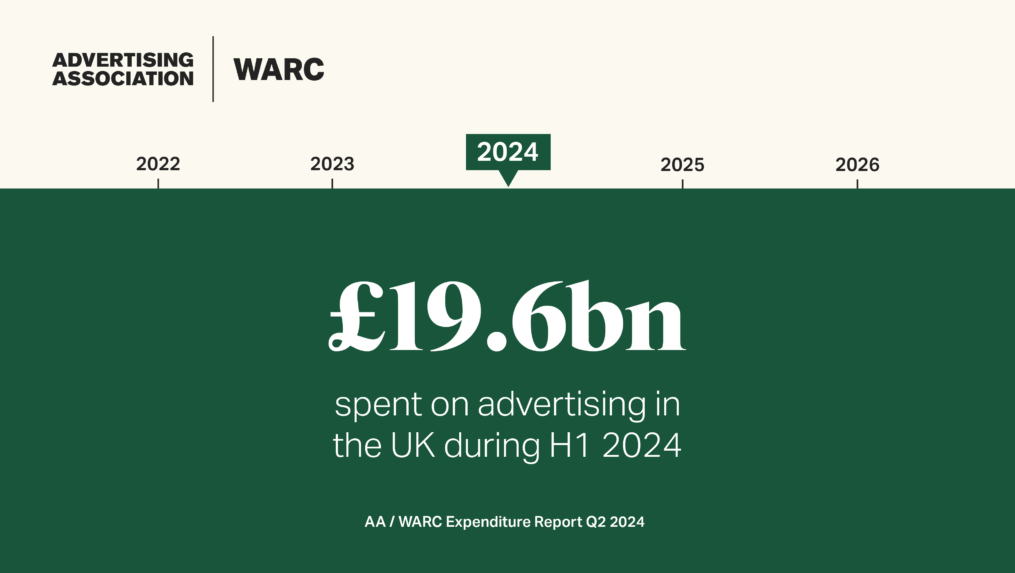Already a member? Sign in below

Adspend reached £19.6bn in first half of 2024, ahead of expectations
London, October 31, 2024: UK advertising recorded £10bn spend during the second quarter of 2024, marking a 13.4% increase, according to the latest Advertising Association/WARC Expenditure Report. This was just over four percentage points (pp) ahead of forecast owing to stronger-than-expected digital growth and the relatively weak comparable results for 2023. The latest figures now provide a picture for the first half of the year, showing adspend increased 13.5% to £19.6bn in H1.
AA/WARC has upgraded its forecasts for 2024, as a whole, by 2.9pp and now expects spend to cross the £40bn barrier for the first time to reach £40.5bn. This is largely due to better digital results and marks a year-on-year increase of 10.6%, with real terms growth for 2024 expected to be 7.9%. The latest report notes that prospects for UK economic expansion have again been upgraded– from 0.6% to 1.1% this year – as inflation begins to ease on household budgets. UK advertising spend is currently expected to register annual growth ahead of key European markets, such as France (8.0%), Spain (5.7%), Italy (5.4%) and Germany (4.0%) in current prices.
The full picture in Q2
The latest figures for April to June this year show key online formats registered growth, including online display (21.6%) and search (12.7%), alongside out of home (17.0%). The Men’s Euros broadcast saw TV benefit from growth of 9.0% for the quarter, representing the strongest quarter for TV in over two years and signalling its resilience. Regional newsbrands and magazines registered their first growth since the pandemic bounce back of Q2 2022 with increases in spend of 1.9% and 0.5% respectively.
The outlook for 2025
Looking ahead, AA/WARC expects the UK’s ad market to reach £43.1bn spend next year, a rise of 6.5% and an uplift of 1.0pp from July’s forecast. This is due to more favourable trading conditions and higher consumer spending.
Stephen Woodford, CEO, Advertising Association, said: “The advertising industry is once again driving UK growth, helping businesses to compete, promote innovation and support jobs. It is an essential engine of the economy and key to the Government’s central ambition to achieve the highest sustained growth in the G7. Advertising has a vital role in funding culture, media and sport – and the results of Q2 show how advertising can play a fundamental part in supporting the success of events such as the Men’s Euros, the Olympics and the Paralympics.”
James McDonald, Director of Data, Intelligence & Forecasting, WARC said: “Four in every five pounds spent on advertising so far this year has gone towards digital formats, money which has mostly been committed programmatically and which is increasingly leveraging AI tools for further efficiencies. The strong growth across the online sector in particular during the first half of 2024 has put the UK’s ad market on course for its best year since the millennium, if the post-pandemic recovery year of 2021 is discounted.”
| Media | Q2 2024 year-on-year % change |
H1 2024 year-on-year
% change |
FY 2024 forecast year-on-year % change | Percentage point (pp) change in forecast vs July | FY 2025 forecast year-on-year
% change |
| Search | 12.7% | 13.4% | 11.0% | +0.9pp | 7.4% |
| Online display* | 21.6% | 22.9% | 18.8% | +10.0pp | 9.4% |
| TV | 9.0% | 5.0% | 0.9% | -3.0pp | -0.2% |
| of which BVOD | 14.2% | 16.8% | 12.1% | -1.6pp | 10.3% |
| Out of home | 17.0% | 16.7% | 12.0% | -0.5pp | 7.2% |
| of which digital | 20.7% | 21.6% | 15.0% | -1.2pp | 8.2% |
| Direct mail | -2.1% | -2.3% | -2.9% | +0.4pp | -3.0% |
| Online classified* | -19.8% | -17.7% | -15.4% | -16.6pp | 2.6% |
| National newsbrands | -3.5% | -4.2% | -4.0% | -1.2pp | -2.0% |
| of which online | 5.0% | 1.2% | 1.3% | +0.7pp | 0.2% |
| Radio | 3.0% | 5.0% | 3.9% | -1.6pp | 3.3% |
| of which online | 14.8% | 3.6% | 6.3% | +2.3pp | 5.9% |
| Magazine brands | 0.5% | -1.8% | -3.7% | -0.2pp | -0.6% |
| of which online | 6.0% | 1.6% | 0.3% | +1.5pp | 1.6% |
| Regional newsbrands | 1.9% | -1.2% | -2.0% | +1.3pp | 1.1% |
| of which online | 4.7% | 2.0% | 2.8% | +3.1pp | 4.1% |
| Cinema | -21.2% | -9.2% | -2.1% | -6.5pp | 2.4% |
| TOTAL UK ADSPEND | 13.4% | 13.5% | 10.6% | +2.9pp | 6.5% |
| Note: Broadcaster VOD (BVOD), digital revenues for newsbrands, magazine brands, and radio broadcasters are also included within online display and classified totals, so care should be taken to avoid double counting. Online radio includes targeted in-stream radio/audio advertising sold by UK commercial radio companies, together with online S&P inventory. Source: AA/WARC Expenditure Report, October 2024 |
|||||
The quarterly Advertising Association/WARC Expenditure Report is the definitive guide to advertising expenditure in the UK, with data for all key advertising media and sub formats dating back to 1982 and forecasts spanning eight quarters ahead.
Already a member? Sign in below
If your company is already a member, register your email address now to be able to access our exclusive member-only content.
If your company would like to become a member, please visit our Front Foot page for more details.
Enter your email address to receive a link to reset your password
Your password needs to be at least seven characters. Mixing upper and lower case, numbers and symbols like ! " ? $ % ^ & ) will make it stronger.
If your company is already a member, register your account now to be able to access our exclusive member-only content.